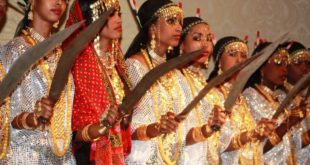SNEHA VAKHARIA
Are you still an immigrant?
Sulaiman Addonia pauses. Then massages his forehead with his fingers.
“Wow. That’s a tough question. Give me a moment.”
There’s a moment’s quiet, and we both listen to the ambient sounds of Barkha Dutt talking about her book on a stage on the lawn outside.
“I don’t know what I am. I first applied for refugee status in England but was told was I wasn’t a refugee. I was an asylum seeker. Then I was given exceptional leave to remain. Ten years later, I became a naturalised citizen of Britain.”
He continues, with something of a smile. “What I am will probably depend on who you ask. I don’t know what any of these terms mean anymore. I guess I’m just a human being.”
Chasing Liberty
We pause and let that last sentence hang in the air. Then I ask, But does England feel like home? What is home?
“Ah. Home is just a thing that got taken away. At least that’s my experience of it.”
Addonia is understating it.
In 1977, after the murder of his father by the regime forces, two-year-old Addonia and his mother fled the authoritarian regime of Eritrea on a camel. They were soon living in a refugee camp in Sudan, where they hoped a better future awaited them.
Home is just a thing that got taken away: Sulaiman Addonia, author and survivor of two refugee camps
They lived in a hut, ate food that was aid and prayed they didn’t fall sick – because there were no medical facilities at the refugee camps. Two years later, when Addonia was four, his mother moved to Jeddah, Saudi Arabia, to work as domestic help. She couldn’t read or write. So instead of writing letters, she would send back taped cassettes of herself for her son and parents to watch.
I ask him if living in a Sudanese refugee camp was difficult.
“It was home. When you’re going through something like that you don’t pause to say oh, life’s really difficult. It was just life.”He eventually moved to Saudi Arabia. And in 1990, with his brother to Britain. There he met a beautiful Belgian woman, got married and moved to Brussels. His mother remains in Eritrea, and Addonia goes long spells without meeting her. Spells as long as fifteen years.
His book Consequences of Love was published in 2009. And he was invited to this year’s Jaipur Literature Festival, to talk about both the book and the plight of emigrees. It’s fair to assume, then, that he’s taken seriously as a writer. I ask Addonia if his mother is proud of him.
He smiles his beautiful, quiet smile. Then straightens his blazer. “Not really. It means nothing to her. She loves me, of course. But I don’t think she understands what being published means. She’s just proud that I’m alive, safe and well.”
Fleeing is not a happy ending
Eritrea is a country that borders Ethiopia, and was once a part of it. In 1991, a revolution defeated Ethiopian powers and Eritrea came into being as a country of its own.
“Every family gave something to achieve that independence – whether it was blood or money. And then western powers came to help rebuild it. But soon enough, all illusions of self-determination and democracy were gone. Eritrea was back at the mercy of an authoritarian regime – just not an Ethiopian one.”
Also read: Should Rohith Vemula’s suicide be seen through the Dalit lens? Pinky Anand says no
But how did that really impact families like your own? And why did Sudan seem like a better place?
“To begin with, there’s compulsory conscription for boys and girls in Eritrea. And this isn’t like the conscription of Israel or Singapore. There’s no fixed number of years. You’re basically expected to serve in the army indefinitely. That means no education, no sanitation, no reading, no communication with family, and you’re serving an authoritarian regime that you despise. For as long as they want you to.”
There are no legal channels to leave the country either. The regime does not take kindly to any requests to leave the country. The only possible mechanism is to pay smugglers to sneak you out. And though the army has a shoot-on-sight policy for fleeing emigres – if you’re incredibly lucky and can afford it – they can be bribed.
It’s a country with two-thirds the population of Delhi. And yet, in 2015, it gave Europe the third highest number of refugees.
So is there survivor’s guilt for successfully leaving the country? Yes and No.
Of course he feels an incredible guilt, for having access to people, ideas and success that his many cousins in Eritrea could never conceive.
But yet, “Leaving isn’t precisely a happy ending. Because you neverreally stop being a refugee. When we came to Britain we didn’t have any money. So we stood in queues and prayed for government support.”
Maybe they would support him. Maybe they wouldn’t. And everymaybe chipped at his sense of dignity.
Writing, eventually, became a way for Addonia to salvage that chipped dignity. It was his way to compensate for his own history and sense of unbelonging. But it brought with it another set of guilts.
“I had a good job, but I quit it. And as writer, I’m not that successful.”
I scoff. He smiles. “Well, at least not financially successful. And when I struggle financially, my mom struggles too.”
I ask him if he’s ever going back to get her. “She’s too old to leave. She won’t be able to adjust anywhere else. And I don’t want to go back. I want to go forward.”
–
 ELL Eritrean Lowland League
ELL Eritrean Lowland League

